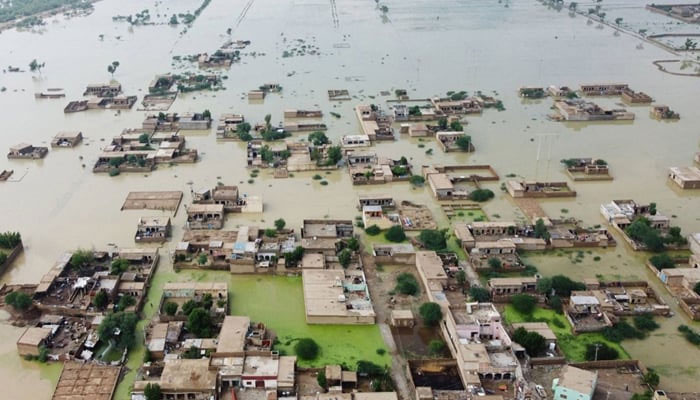‘Communities’ preparedness wards off big disasters’
Islamabad:Dr Ayaz Qureshi, Associate Professor, Medical Anthropology, University of Edinburgh, UK, and director of Edinburgh Centre for Medical Anthropology, has said that anthropological, pro-environment and people-centred approaches to understanding people’s vulnerabilities to climate change are very important for redressing the impact of natural disasters on vulnerable communities.
Dr Qureshi was giving a talk on "The impact of climate change on health in Pakistan” organised here by Department of Anthropology, Quaid-i-Azam University. Dr Qureshi who is also an alumnus of the Department, presented data on how climatechange-induced weather events such as 2022 floods in Pakistan are becoming more frequent, irregular, unpredictable and erratic. He drew attention to the weaknesses of the health system and the lack of preparedness to deal with the health impacts of the climate change-related events by focusing on the case study of recent floods in Pakistan.
When communities are prepared, extreme weather events do not become big disasters, observed Dr Qureshi. He said that disaster preparedness can be achieved through allocation of better resources in the health sector, training of healthcare workers to mitigate the health impacts of disasters, strengthening the forecasting and communication systems within local communities and building on local knowledge rather than merely privileging technical fixes before and after a natural disaster strikes. Moreover, he opined, disaster responses need to pay more attention to commonly neglected areas of health such as gender sensitive care, mental health, chronic conditions and disabilities.
Dr Qureshi concluded that crises like 2022 floods are not just one-off natural events resulting from climate change but they also unleash and complicate ongoing processes of dispossessions and deprivation, such as life-long disabilities and traumas. They push communities into poverty and aggravate inequalities within them. Therefore, they should be responded to as such rather than focusing merely on providing humanitarian aid in the short-term or securing financial concessions at international forums which may benefit the ruling elite in the name of victims of climate change, thus ending up further entrenching inequalities in health and life, he said.
Dr. Inam Ullah Leghari, Chairperson, Department of Anthropology, thanked the attendees and guest speaker for his inspirational talk and voiced his aspiration for similar academically enriching engagements in forthcoming departmental endeavours.
-
 Factory Explosion In North China Leaves Eight Dead
Factory Explosion In North China Leaves Eight Dead -
 Blac Chyna Opens Up About Her Kids: ‘Disturb Their Inner Child'
Blac Chyna Opens Up About Her Kids: ‘Disturb Their Inner Child' -
 Winter Olympics 2026: Milan Protestors Rally Against The Games As Environmentally, Economically ‘unsustainable’
Winter Olympics 2026: Milan Protestors Rally Against The Games As Environmentally, Economically ‘unsustainable’ -
 How Long Is The Super Bowl? Average Game Time And Halftime Show Explained
How Long Is The Super Bowl? Average Game Time And Halftime Show Explained -
 Natasha Bure Makes Stunning Confession About Her Marriage To Bradley Steven Perry
Natasha Bure Makes Stunning Confession About Her Marriage To Bradley Steven Perry -
 ChatGPT Caricature Prompts Are Going Viral. Here’s List You Must Try
ChatGPT Caricature Prompts Are Going Viral. Here’s List You Must Try -
 James Pearce Jr. Arrested In Florida After Alleged Domestic Dispute, Falcons Respond
James Pearce Jr. Arrested In Florida After Alleged Domestic Dispute, Falcons Respond -
 Cavaliers Vs Kings: James Harden Shines Late In Cleveland Debut Win
Cavaliers Vs Kings: James Harden Shines Late In Cleveland Debut Win -
 2026 Winter Olympics Snowboarding: Su Yiming Wins Bronze And Completes Medal Set
2026 Winter Olympics Snowboarding: Su Yiming Wins Bronze And Completes Medal Set -
 Trump Hosts Honduran President Nasry Asfura At Mar-a-Lago To Discuss Trade, Security
Trump Hosts Honduran President Nasry Asfura At Mar-a-Lago To Discuss Trade, Security -
 Cuba-Canada Travel Advisory Raises Concerns As Visitor Numbers Decline
Cuba-Canada Travel Advisory Raises Concerns As Visitor Numbers Decline -
 Anthropic Buys 'Super Bowl' Ads To Slam OpenAI’s ChatGPT Ad Strategy
Anthropic Buys 'Super Bowl' Ads To Slam OpenAI’s ChatGPT Ad Strategy -
 Prevent Cancer With These Simple Lifestyle Changes
Prevent Cancer With These Simple Lifestyle Changes -
 Air Canada Flight Diverted St John's With 368 Passengers After Onboard Incident
Air Canada Flight Diverted St John's With 368 Passengers After Onboard Incident -
 Experts Reveal Keto Diet As Key To Treating Depression
Experts Reveal Keto Diet As Key To Treating Depression -
 Inter Miami Vs Barcelona SC Recap As Messi Shines With Goal And Assist
Inter Miami Vs Barcelona SC Recap As Messi Shines With Goal And Assist




